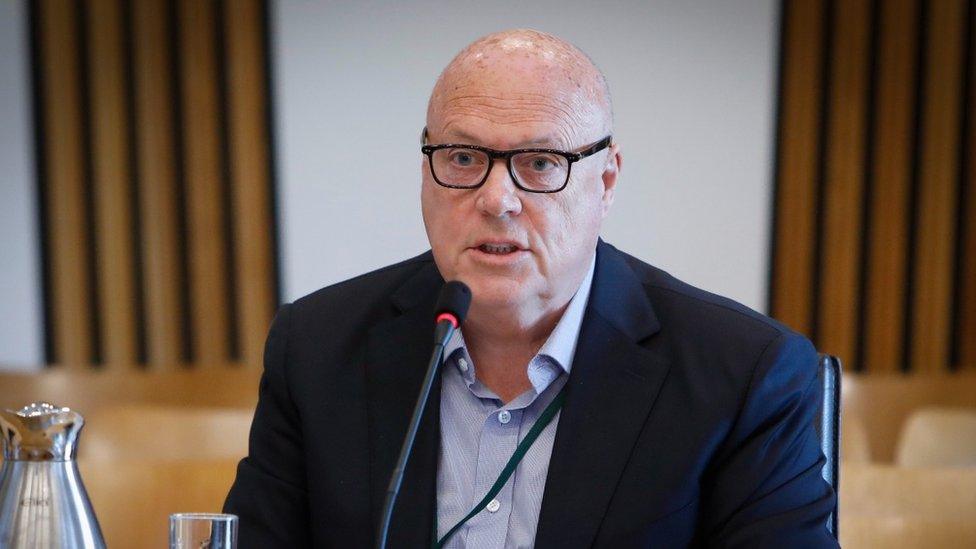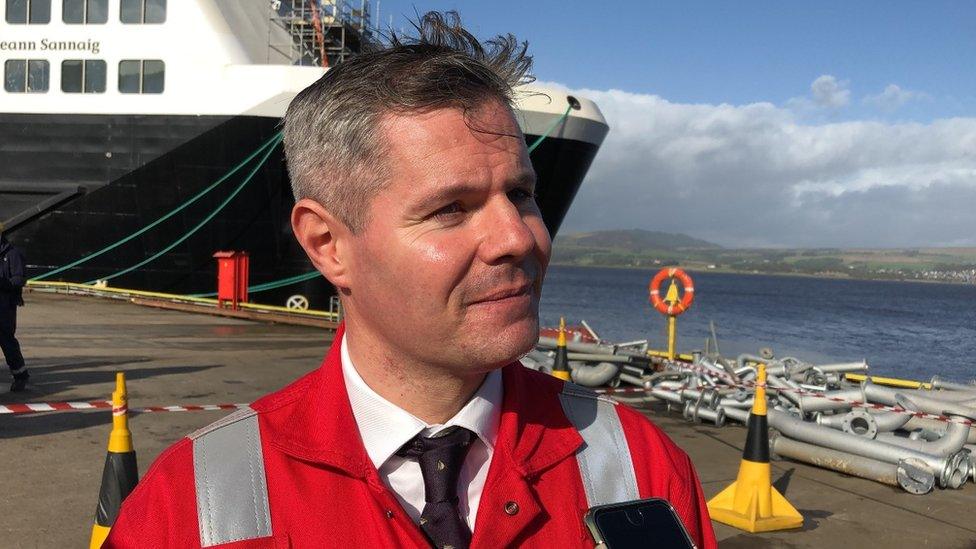Ferry cables blunder blamed on new management
- Published

Jim McColl was giving evidence to Holyrood's public audit committee
A blunder that added £8.7m to the cost of two overbudget ferries was the fault of government-appointed management, according to the yard's former owner.
In February it emerged that hundreds of cables already installed on Glen Sannox were too short to reach control panels.
But ex-Ferguson Marine owner Jim McColl told MSPs the problem arose because the position of equipment was changed.
He also said he was given assurances that his alternative to a full builder's guarantee was acceptable.
Mr McColl, who rescued the Port Glasgow shipyard from administration in 2014, was giving evidence to MSPs on Holyrood's public audit committee.
He blamed the Scottish government's ferries procurement agency CMAL for most of the problems with the building of the two CalMac ships, and claimed the nationalisation of the yard in 2019 had been a "catastrophe".
Mr McColl said the government-appointed "turnaround" director Tim Hair made a mistake in dismissing the previous management, many of whom were asked to sign non-disclosure agreements or "gagging orders", because it meant valuable expertise was lost.
"What was wiped out was all the people who knew what was going on, all the systems that controlled it and the design people who were behind it," he told the committee.
"There was a black hole there and for six months nobody knew what was going on in that yard."

Nicola Sturgeon visited the Ferguson shipyard on the day it was announced as preferred bidder for the ferries contract
Earlier this year Finance Secretary Kate Forbes told MSPs that "legacy" issues regarding cabling would delay the construction of the first ferry, Glen Sannox, by a further four months and add £8.7m to the costs.
However, Mr McColl insisted that these were not legacy issues, but instead arose because of changes made by the new management team after the yard was nationalised.
"We know that they have moved control panels, they have moved pumps they have moved equipment," he said.
"If you move them and there's already a cable in place to go to them, it might not reach where they've been moved to - and that's what's happened."
The nationalised shipyard, now known as Ferguson Marine Port Glasgow, said some equipment was moved, but costs were factored into the budget for remedial work.
A spokesperson said: "Separately, there is the 'legacy cable' issue that was reported to parliament on 9 February 2022, which is one affecting cables that were fitted prior to administration/nationalisation.
"We uncovered this as an unexpected issue whereby some of these cables were too short and others were not routed in accordance with the design information that we hold. These cables were not planned for replacement or adjustment, which is why the solution has impacted time and cost."
CMAL has repeatedly disputed Mr McColl's claim that it hindered the building of the ships, claiming that the shipyard pressed ahead with constructing them "at risk" without getting the design signed off by either CMAL or regulators.
Refund guarantee
The two ferries, still under construction, are currently expected to be delivered next year, five years late, having cost the taxpayer about £250m - two and a half times the original budget.
The award of the contract to Ferguson Marine Engineering Ltd (FMEL) has been subject to much debate at Holyrood recently after Audit Scotland criticised the absence of a full builder's refund guarantee, which would have provided full repayment if the £97m project got into trouble.
The CMAL board raised concerns about this after Nicola Sturgeon announced FMEL as preferred bidder in August 2015, but then Transport Minister Derek Mackay went ahead with awarding the contract in October that year.
Mr McColl insisted he had offered a suitable alternative to a builder's refund guarantee - a £25m deposit and an agreement that CMAL would have ownership of the ships and raw materials while the vessels were under construction.
"Our argument at the time was they'd got better than 100% refund guarantee because they've got everything that's gone into the vessels and they've got £25m that is on deposit which can be called," he said.

The ferries contract was awarded to FMEL and approved by then Transport Minister Derek Mackay
He also referred to a letter he had received from Derek Mackay, dated February 2015, which stated that while the CMAL board had a preference for a full refund guarantee, it had on occasion taken "alternative approaches" to ensure that shipyards such as Ferguson could bid for government contracts.
CMAL said it was unable to comment on Mr Mackay's letter but insisted the builder's refund guarantee was a mandatory requirement of the contract.
A spokesperson said: "Despite what was said at this morning's committee, the first we were made aware of FMEL's inability to meet this requirement was after it had been announced as the preferred bidder."
Mr McColl, a multi-millionaire businessman who specialises in turning around failing engineering firms, previously served on the council of economic advisers under both First Minister Nicola Sturgeon and her predecessor Alex Salmond.
He said he had been asked by Alex Salmond and John Swinney to help save the yard from collapse in 2014, but denied he had any special access to SNP ministers during the saga.
"If there was any trouble with businesses, I would get a call from Alex Salmond. I always took a look and said no," he said.
He said he took a different approach with Ferguson because he genuinely believed shipbuilding on the lower Clyde could have a strong future.
Had it not been for the ill-fated ferry contracts the yard could now be employing 700 people, he said.